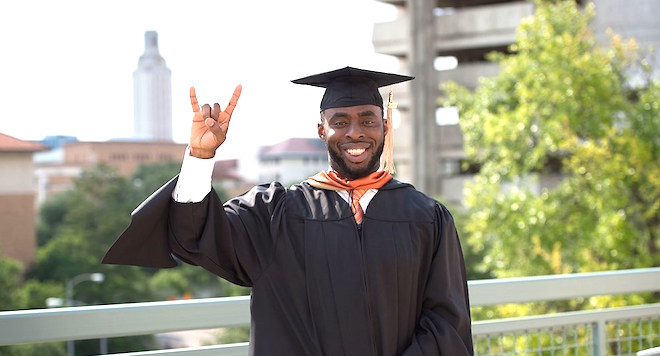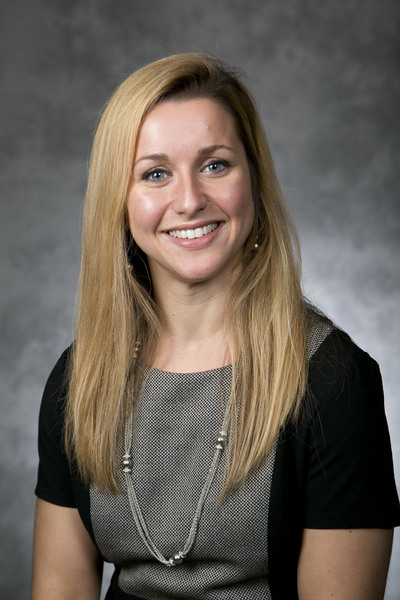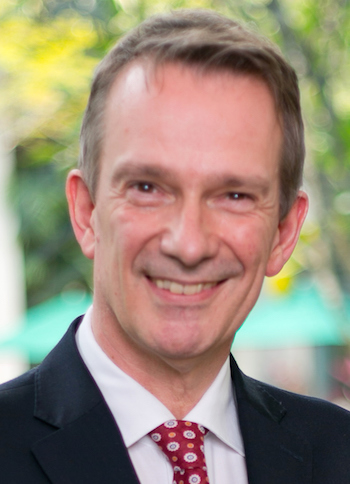
Chris Ogbonnaya at graduation at UT-Austin McCombs School of Business
‘I GET TO DO THIS,’ NOT ‘I HAVE TO DO THIS’
Sound harsh? There were plenty of exceptions. To cope, many of this year’s “Best & Brightest” EMBA graduates adopted a new mindset. It wasn’t a steely frontier mindset that some might expect. Chris Ogbonnaya, an Academic All-American as an undergrad who played six years in the NFL, encourages incoming EMBAs to come in with an open mind. “Embrace the process,” advocates the University of Texas grad. “The learning is in the struggle.”
Despite a heavier workload and tighter schedule, Rodney Cheung arrived at the University of Toronto with a sense of gratitude. And it made all the difference for him. “One aspect that worked for me early on was the changing of your mindset from “I have to do this” to “I get to do this.” It puts things in an entirely different light. Instead of coping and thinking of ways to get by, you believe that you have this exceptional opportunity to learn and to have fun.”
It was a mentality that anchored Cheung’s perspective throughout his two years at Rotman. “This is how one feels when you’re working on activities you truly enjoy and it allows you to be at your best. You will face periods of very high stress but instead of being a detriment to you, the stress will give you the ability to build newfound strengths and abilities. The reshaping of your mindset can be the root of this new development.”
BE MORE THAN ‘JUST AS GOOD’

University of North Carolina’s Simone Saleh
What advice does the Class of 2017 have for EMBA applicants looking to get into their target schools? Wharton’s Katie Keegan, a former Deputy Chief of Operations at the National Security Agency, recommends spending time on campus before writing up an application. “You’ll get a sense for the diversity of the class, the rigor of the academics, and the incredible energy of the school,” she points out. “It will inspire you, and that will come across in your application materials.”
For Michael Fox, a physician at the Mayo Clinic in Arizona, self-reflection was the starting point. He began the process by honing in on what he wanted to accomplish; how he would fit the course requirements into his schedule; and what he needed to do to get buy-in and support from his employer and family. This exercise did more than prepare Fox for the hazards faced by EMBAs. It also helped him play to another audience: adcoms, who are looking for candidates who have kept commitments and conquered adversity. “Applicants should be ready to articulate clear answers to these questions during their interview,” Fox notes.
Of course, adcoms are also angling for professional pedigree and academic achievement too. Test scores and job titles are often commodities that make applicants “just as good” as other applicants in the words of Simone Saleh, who earned her EMBA at the University of North Carolina. A 26 year-old restaurateur from Raleigh, Saleh used her youthful spirit and non-traditional background to differentiate herself from more seasoned candidates. Her advice: Embrace why you are different. “It is our personal, unique “value propositions” that set us apart in class and in the real world,” she says. “I would challenge applicants to reflect on how they will make their mark in the business world and convey that in their application and interviews.”
That doesn’t mean experience doesn’t matter. Instead, Edward Kroger, a physician-turned-lawyer, counters that the decision-making underlying experience is the key selling point. “Be able to show that you eagerly sought out professional growth opportunities and leadership roles when safer choices were available. Your ability to learn, grow and repeatedly challenge yourself professionally will prepare you well for an executive MBA program.”
“DO NOT OVERTHINK IT — JUST DO IT”
Looking back on past methods and motivations requires self-reflection. For INSEAD’s Andy Bushell, who waited until he was 51 to start business school, such ruminations brought to light a rather uncomfortable question: Do I possess enough real world business experience to make an MBA worthwhile? Answering this question, he says, requires a real delicate balance, with waiting sometimes being the better choice.

Andy Bushell of INSEAD
“The learning you take away will be deeper; your opportunities to really apply the learning will be easier to implement; and you will have more to share with the class discussions and to help your classmates,” he emphasizes. “You may not need to wait as long as I did, but do consider carefully the timing as too soon could limit the value of the learning, while too late means you have less time to capitalise on the increased power you will have afterwards!”
Too cautious? That’s what the University of Minnesota’s Gaurang Daftary thinks. Four years younger than Bushell, this “eternal learner” takes a carpe diem philosophy to the question of whether starting an executive MBA is the right move.
“The MBA affects one from the first day of classes,” he observes. “If you are good at math, it augments your capability; if you excel in communication, it teaches you how to deliberately think about your strategy and execute it to perfection. No one in my class is the same person that we were when we started. It is a brand-new chance to weave life experiences with education and give yourself a second chance to do it — just much better this time. Do not overthink it — just do it!”
DON’T MISS: WHAT EMBAs LOVE MOST ABOUT B-SCHOOL OR THE BIGGEST MYTHS ABOUT EXECUTIVE MBA PROGRAMS





Questions about this article? Email us or leave a comment below.